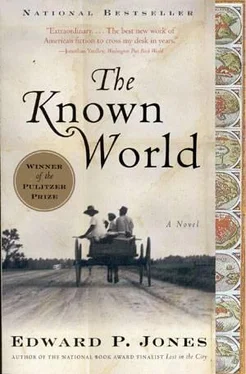The Elstons rarely had more than thirteen slaves, though the gambler Jebediah Dickinson, for the time he was there, would bring the number to fourteen. Thirteen slaves were always enough to serve them in the house and to farm the few acres that would meet all their needs. The field slaves lived in quarters closer to their masters than any hands at any plantation or farm in Virginia. Why this was so, no one ever knew. There was certainly land enough to place them farther away. Those Elstons didn’t have slaves, colored people said, they had neighbors who happened to be slaves.
Fern did not tell Anderson Frazier, the white man who wrote pamphlets, that Henry Townsend was the darkest student she ever had, but she did tell him that he was the first freed slave and was probably the brightest of all her students.
”It might be that his blood was untainted in some way,” she said as the time neared noon that day with Anderson. She was prepared to give no answer if he asked what she meant by that, but Anderson said nothing. She listened to the word untainted echo in her head, thinking that it was the first time she had used it in a long time. “When he could read and write, I opened my library to him, but most of the books did not hold him the way I thought they might have. He was a man, of course, and not a child given to luxuriating. He read, enjoyed, and presented himself for the next one. He would take a book back to his land. Where he got the time to read, I do not know because the word I received was that he was working on the house all day long.” That August day with Anderson, a man and a woman, hand in hand, walked by and she waved to them and the couple waved back. “Now and again some book would take a firm hold of him and he would talk about it for days. Do you know Milton, Mr. Frazier? Do you know Paradise Lost, Mr. Frazier?”
“I do, Mrs. Elston.”
“So did Henry. ‘Ain’t that a thing to say’ is what he said of the Devil who proclaimed that he would rather rule in hell than serve in heaven. He thought only a man who knew himself well could say such a thing, could turn his back on God with just finality. I tried to make him see what a horrible choice that was, but Henry had made up his mind about that and I could not turn him back. He loved Milton and he loved Thomas Gray. I am partial to neither, but I must reveal them to my students nevertheless.” She turned to Anderson and tipped her head back somewhat so that her whole face was visible. She continued, “I could not break him of his diction. Sometimes he spoke the way I wanted him to speak, but there were so many times when he spoke the way a man had to speak who had been twenty years in the field. His own father spoke that way as well.”
The day Robbins saw him wrestling with Moses, Henry Townsend reached his parents a little after seven that evening. Mildred and Augustus were awake and he was glad. He had stayed away and not told them about the purchase of Moses or that he had started building a house. Part of him just wanted to surprise them about the new house. Part of him had been afraid to tell them about Moses. But Henry was weary in the mind after what Robbins had said to him and thought that sharing the story of his house and Moses would be a good way to pass the evening before sleep. He found them at the kitchen table and Mildred stood and covered his face with kisses. Augustus was playing with one of the dogs, tugging gently at its ears. “Leave off now,” he told the dog as he rose and the dog sidled away. Augustus and Henry kissed on the mouth, a habit born in those days when Henry and Robbins traveled about, a way of pulling Henry back into the family. The day of the wrestling the family had not been together in nearly two months.
They sat at the kitchen table. Mildred put a slice of apple pie before her son, then took it back and put a second slice on the plate right beside the first. As always, they were silent for very long moments. The time the three had spent apart in the early years had built up an awkwardness that came out in such moments: Augustus first being free and working to free his wife and then mother and child living together as slaves and then father and mother working to free Henry and then the three of them together forging a life just when the sap was commencing to rise in the boy. But then, in the midst of the silence, Mildred or Augustus would do some throat clearing and the words would flow again among them.
“I’m workin on a house,” Henry said in between chews on the second piece of pie. “I’m puttin up a house. A big house.”
Mildred and Augustus looked at each other and smiled. “What next, a wife?” Augustus asked.
“Maybe. Maybe. It’s gonna be a good house, Papa. Even white people will say, ‘What a nice house that Henry Townsend got.’ ”
“Why ain’t you tell me, Henry?” Augustus said. “You know I woulda done all I could. I coulda come down there for you. Thas why I’m here.”
“I know, Papa. I just wanted to get anough of somethin for you and Mama to make a fuss over. Maybe you can come in when we get to that second story.”
“Two floors,” Mildred said. “Look out, Augustus, he’s buildin somethin bigger than what you got.” She winked at her husband. “When ‘we’ get to the second floor? Who this ‘we’ you talkin about?”
Henry put down his fork from the last of the pie. “Thas the other part of the news. I got help.”
Augustus shook his head in pleasant wonder. “Who you got? You hired out Charles and Millard from over Colfax’s plantation. They good men with they hands, I haveta say. Good men and worth what you gotta pay. Get your money out the backyard and do right by em. And Colfax’ll let em keep some of what they earn. That Charles could use the money with him tryin to buy hisself away from Colfax. Is it Buddy? Free Buddy, not Buddy thas from Dalford’s plantation. I don’t know bout slave Buddy’s work sometime. But free Buddy be somethin else.”
“No, Papa. I got my own man. I bought my own man. Bought him cheap from Master Robbins. Moses.” The pie had made him drowsy and he was thinking how good it would be to go upstairs and fall asleep. “He a good worker. Lotta years in him. And Mr. Robbins lend me the rest of the men for the work.”
Mildred and Augustus looked at each other and Mildred lowered her head.
Augustus stood up so quickly his chair tilted back and he reached around to catch it without taking his eyes from Henry. “You mean tell me you bought a man and he yours now? You done bought him and you didn’t free that man? You own a man, Henry?”
“Yes. Well, yes, Papa,” Henry looked from his father to his mother.
Mildred stood up, too. “Henry, why?” she said. “Why would you do that?” She went through her memory for the time, for the day, she and her husband told him all about what he should and should not do. No goin out into them woods without Papa or me knowin about it. No steppin foot out this house without them free papers, not even to go to the well or the privy. Say your prayers every night.
“Do what, Mama? What is it?”
Pick the blueberries close to the ground, son. Them the sweetest, I find. If a white man say the trees can talk, can dance, you just say yes right along, that you done seen em do it plenty of times. Don’t look them people in the eye. You see a white woman ridin toward you, get way off the road and go stand behind a tree. The uglier the white woman, the farther you go and the broader the tree. But where, in all she taught her son, was it about thou shall own no one, havin been owned once your own self. Don’t go back to Egypt after God done took you outa there.
“Don’t you know the wrong of that, Henry?” Augustus said.
“Nobody never told me the wrong of that.”
Читать дальше












